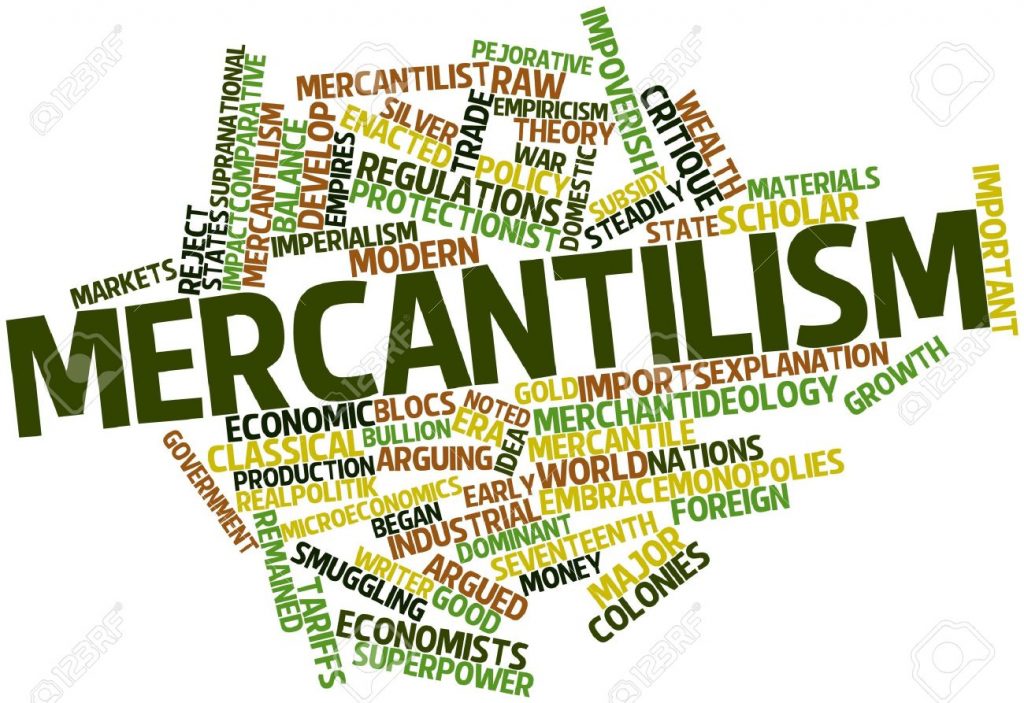Mercantilism is one of the most influential economic doctrines in the history of economics; however, the school that dominated European thought for two centuries is now considered a historical artifact. According to scholar Lars Magnusson, no self-respecting economist would associate himself or herself with mercantilism in today’s society.1

Mercantilism was the dominant economic policy most associated with the Early Modern period of the 16th and 17th centuries. During this era, the only true measure of a country’s wealth and success was thought to be the amount of gold and silver reserves that a nation possessed. In order to add precious metals to a nation’s reserves, it would seek to maximize its net exports and minimize its imports in order to secure its prosperity. Countries that had more wealth could in turn raise and maintain stronger armies and navies, and thus be more powerful. Moreover, according to the doctrine of mercantilism, the gold and silver reserves in the world were thought to be limited. Therefore, one’s gain in precious metals would come at some other country’s expense. Trade was a zero-sum game. For example, the gain from trade for England, mercantilism taught, would be a loss for France or Spain. The best way to ensure a nation’s prosperity was by limiting imports and increasing exports, thereby generating a net inflow of gold and silver, thus increasing the country’s overall gold stocks. Every European nation was trying to find a market for its exports to bring wealth while limiting imports, which would otherwise transfer wealth to others.2
Mercantilism was an economic theory that placed the nation, not the individual, at the center of economic activity. Economic nationalism, the effort to boost exports, was seen as a state-sponsored endeavor. States backed domestic production. Governments applied many forms of protectionist policies in order to promote efficient domestic consumption and maximize the export of surplus production. According to the famous British Navigation Act of 1651, all imports to England had to be carried to English ports on English ships. Colonial exports to Europe had to first land at an English port before going any further. These laws sharply restricted colonial trade with anyone else but England. With mercantilism, each country sought to export as much as possible while preventing imports. As a result, the economic importance of colonies to the success of colonizing powers became vital.3
According to the famous British Navigation Act of 1651, all imports to England had to be carried to English ports on English ships. Colonial exports to Europe had to first land at an English port before going any further. These laws sharply restricted colonial trade with anyone else but England. With mercantilism, each country sought to export as much as possible while preventing imports. As a result, the economic importance of colonies to the success of colonizing powers became vital.3

Colonies played a critical role for European countries. Each country sought to become self-sufficient so that they would not need to import goods from the other European powers. Colonies provided the precious metals and raw materials that European countries needed but could not produce at home. They were also markets for finished goods. According to mercantilism, colonies could only trade with their mother nation, and the direction of wealth should flow to the mother nation. In order to protect colonial trade, each European nation developed powerful navies, which protected its nation’s trade routes.4
The collapse of mercantilist ideology can be attributed to Adam Smith’s classic book The Wealth of Nations. Smith argued that the wealth of a nation does not consist in the amount of gold or silver stashed in its treasuries, but in the productivity of its workforce. He stated that trade can be mutually beneficial for nations, and that the general growth of wealth did not come at the expense of others, but that a “rising tide” of growth would benefit all, which is directly opposed to the ideology of mercantilism.5
- Lars Magnusson, Mercantilism: the shaping of an economic language (London: Routledge, 1994), 8. ↵
- John Maynard Keynes, The general theory of employment, interest and money (New York: Harcourt, Brace and Co., 1936), 3. ↵
- Alan Brinkley, American History: Connecting with the Past Volume 2, 15 edition (New York: McGraw-Hill Education, 2014), 26-27. ↵
- The Concise Encyclopedia of Economics, 2008, s.v. “Mercantilism,” by Laura LaHaye. ↵
- The Concise Encyclopedia of Economics, 2008, s.v. “Mercantilism,” by Laura LaHaye. ↵



85 comments
Christopher Hohman
Nice article. The doctrine of mercantilism was very influential in the early modern period. It does seem to be rather ruthless. The idea of it being a zero sum game is really scary. To have all the major nations competing against each other for finite resources and land is really something that I am glad that we have grown out of. Free trade even though it had its downfalls is ultimately a more secure system that wishes to bestow prosperity on a greater number of people
Sebastian Carnero
The most difficult task that appears after gaining power is to maintain it. It is very interesting how the ideas of one person are able to change the conditions of the competition between nations. We now know that the best way to grow not by eliminating competition, but by focusing on using what you have in the best way possible. Minimizing opportunity costs and maximizing production.
Samuel Ruiz
I had never heard of Mercantilism before and I think what caught my attention for this article was the word itself. What went through my mind while reading this article was how interesting it is that much of human history tends to be a development of ways to be on top. Mercantilism is an interesting doctrine that always seems to work for the benefit of one and the loss for another. Great article!
Regina De La Parra
This was a very informative article! I remember learning about mercantilism in high school but this article helped me learn it more historically and not just the term. It is very interesting to learn how countries would use this to put themselves at the top. I also found it really interesting how Adam Smith kind of removed the idea of mercantilism. Overall this was an amazing article!
Andrew Dominguez
This article was very good, it showed how countries would try to outdo one another in order to become the most powerful. Its colt see countries backing their own products, which allowed jobs to be created in their country. Still this wasn’t the way to boom economically, since money would just remain in that country. Even though we have another strategy today, it still isn’t perfect. It doesn’t matter the strategy, since their will always be flaws.
Natalia Flores
This is a very informative article! This article is very refreshing especially when we have been taught Mercantilism since Middle School. It’s very interesting to hear that the policy focused on the state rather than the individual which makes me wonder where the individual fit into this policy. Did they not consider them at all? Were they insignificant or were they just considered a need for an army?
Maria Esquivel
I do not know much about economics but your article provided good detailed information about mercantilism and I found it really interesting. It was interesting to see how other countries dealt with imports and exports during the 16th century. I also found it intriguing to read how during this era a country’s wealth was measured by the amount of gold and silver they owned.
Fumei P.
Mercantilism is an interesting concept. I’ve heard of this term before but I never fully understood it until I read this article. It sounds good in theory, exporting goods made in your home country and limiting imports. Keeps the merchandise moving and the money flowing, but its also extreme to think that they wouldn’t do business with other country because they believed it was a zero sum game.
Tyler Sleeter
Very informative article. I had never heard of the economic theory of mercantilism until reading your article. It seems to me that mercantilism is a simplistic attitude towards wealth that is somewhat similar to the current capitalistic system within our own country. Many people I hear speaking about being rich act like wealth is a pie with limited pieces available. Instead, like Adam Smith points out, wealth is something that could be mutually beneficial if pictured in a different way.
Mario Sosa
I have read countless articles here on people, religion, and events, but I do not recall reading about an economic policy, so this was a refreshing article to read. With mercantilism as the main policy in Europe, I can see why there was such a fierce competition for the Spaniards and other European countries to find gold and create colonies in the New World. I also found interesting how mercantilism fell apart right when Adam Smith released his “The Wealth of Nations” book, leading to the formation of capitalism. An excellent, unique article, fantastic job!